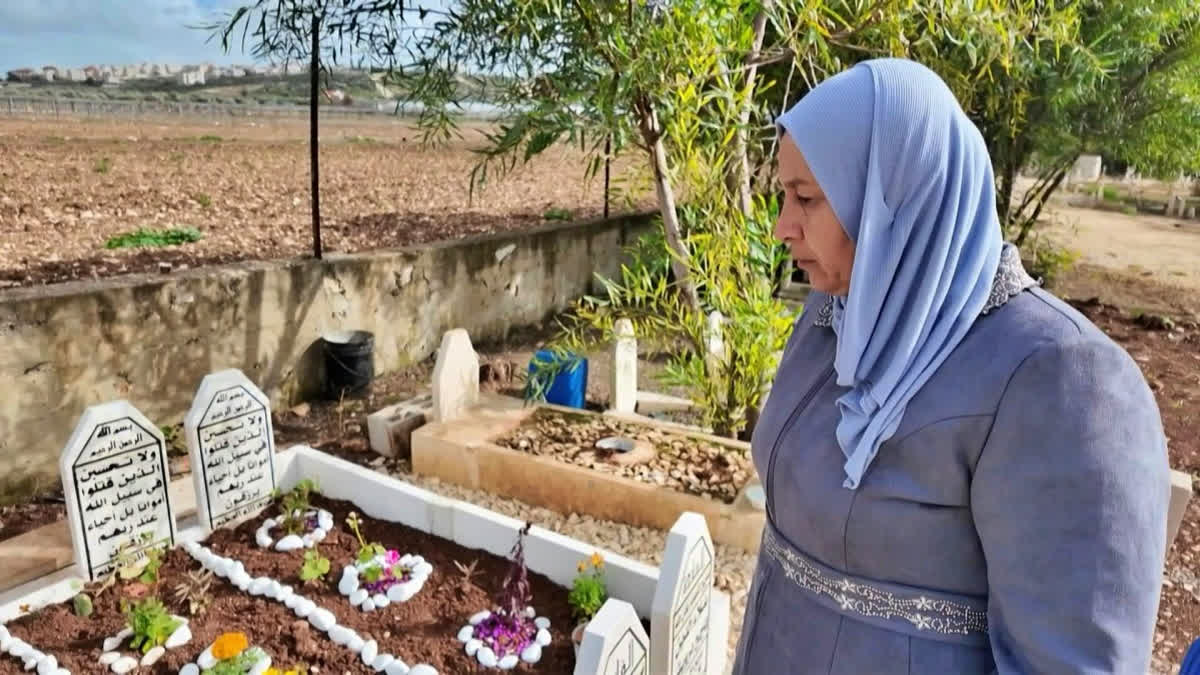Ramallah (Palestine): The official death toll in Gaza crossed 30,000 earlier this week. The besieged strip is the most terrorised place on earth at the moment, with Israel continuing with its offensive after the October 7 Hamas attack that killed 1,160 people, including civilians and armed Israeli settlers.
While civilians, most of them children and women, continue to lose their lives in Gaza, the situation has been dreadful in the West Bank as well where, according to the Palestinian Authority, more than 420 Palestinians have been killed by Israeli forces or settlers since October 7. Thousands of others have been arrested leaving their families scarred. Palestinian prisoner advocacy groups say the number of incarcerated Palestinians has jumped from 5,200 before October 7 to about 9,000.
Ibtissam Hussein Hazza, 53, is one of the parents who has lost four of her children in Israeli drone strikes earlier this year. Ibtissam said she was "forever scarred" on January 7. That day, four of her 10 children were killed in a drone strike in Jenin, in the north of the West Bank.
"I woke up to the phone ringing, it was my son. He told me that a drone struck al-Shouhada roundabout, call my brothers. I called them but they never answered. Then i saw a video on Telegram of people calling for ambulances to come. I recognised my son (among the dead) in the video." The shock caused her to have a stroke affecting her left arm and leg, she said.
Seven people who were in a cafe were killed, witnesses said, including Ibtissam's sons Darwin (29), Hazza (27), Ahmed (24 ) and Rami (22). An Israeli army spokeswoman said they were a "group of terrorists" who that day had launched "explosive devices at a military vehicle" resulting in the death of an Israeli soldier and injuring others.
Ibtissam insisted her sons never took part in any attack. "I don't know how they died. Did they suffer a lot?" she said. "It was a very difficult feeling. A woman's labor pain is hard to endure but the pain of loss is more difficult because I know that I will never see my child again."
The grieving mother believes her lost sons are always around her. "I never felt they are absent. It is true that I do not see them at home, but I feel their spirits with me in every moment and every decision I make, they are by my side."
"I don't sleep anymore... at most two hours. I wake up in the night and pray... I open their photo albums and look at them for hours."
While Ibtissam grieves for her lost sons, there are those parents as well in the West Bank whose children have been jailed by Israeli forces. "I don't sleep anymore," Latifa Abu Hamid said while looking at pictures of her children hanging on the walls of her living room, two women and 10 men. All have passed through Israeli prisons.
Four are still languishing in jail, while a fifth died in custody 14 months ago. His body remains in the hands of the Israelis, she said. Another died in 1994, in an operation triggered by the death of an Israeli. Latifa, 74, said she wanted to pave "another path" for her children, one of "education and knowledge".
"Every mother's dream is to teach their children and to see them start families. There is no mother who says to their children: 'Go and attack'", she said. "No mother wants their son to be behind bars or to be killed," she added, yet her children "live the reality" of an occupied territory.
"When they see a mother and a father being beaten in front of them and they see hundreds of heavily armed soldiers storming a camp, a village or a town and wreaking havoc, they store those events in their memory... and chart their own course accordingly."
Latifa lives in a house in Ramallah, in the occupied West Bank, given to her by the president of the Palestinian Authority, which has its seat in the city. Her home, in the Al-Amari refugee camp, was demolished three times by Israeli authorities, who eventually confiscated the land on which the house was built. Israel demolishes the homes of Palestinians who take part in attacks that kill Israelis. It is a policy denounced by human rights organisations, who say it is a collective punishment.
For Latifa, what matters most is the fate of her children still detained by Israel. The situation has become more complicated for her since the start of the war in Gaza. Israeli authorities have announced a state of emergency in the prison system, which has translated into harsher conditions for detainees, including an end to family visits.
In a joint statement released in January by the Commission for Detainees Affairs, the Palestinian Prisoner Society and Addameer Human Rights Association, the Israeli army had detained 6,420 Palestinians in the occupied West Bank since Oct. 7. “More than 400 children, 215 women and 51 journalists are among the detainees,” the statement read. “These figures don’t include those arrested in the Gaza Strip as the Israeli occupation refuses to give information about their fate,” the statement added. (With AFP inputs)
Read More



